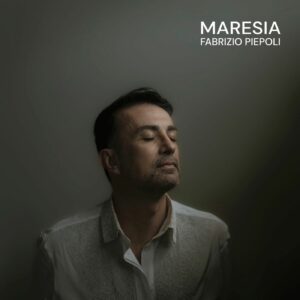 De zuid-Italiaanse zanger en multi-instrumentalist Fabrizio Piepoli brengt met zijn nieuwe album Maresia een ode aan liederen van Puglia en de Middelandse Zee.
De zuid-Italiaanse zanger en multi-instrumentalist Fabrizio Piepoli brengt met zijn nieuwe album Maresia een ode aan liederen van Puglia en de Middelandse Zee.
English version below
Maresia is het Portugese woord voor het schuim dat verschijnt op de top van de golven en meegevoerd wordt door de wind. Een prachtige metafoor voor de muziek van de Italiaanse zanger Fabrizio Piepoli die met zijn nieuwe album een muzikale reis maakt langs de culturen van de landen rond de Middellandse Zee. In een bevlogen exposé horen we o.a. de tarantella (Maresia en Stella D’Ori) uit Puglia, de fado uit Portugal (Ave Maria Fadista) en de Turkse dansmuziek in Sair. Piepoli speelt zowel eigen stukken, traditionals als ook werken die door anderen werden gecomponeerd. Bijzonder daarbij is dat hij alle instrumenten zelf bespeelt, waaronder dchitarra battente, saz, ûd en de klassieke en basgitaar, aangevuld met percussie. Daarnaast is hij een bevlogen zanger die moeiteloos switcht tussen bas-, tenor- en zelfs mezzo-sopraanstem (in Ninna Nanna di Carpino) en prachtige meerstemmigheid in Occhi de Monachella en L’America. Fabrizio Piepoli is een musicus in hart en nieren die de kernmerken van elke stijl moeiteloos uitkristalliseert en ze op eigen wijze bewerkt tot juweeltjes. Het slotstuk is het door hem gecomponeerde Tetuán (een wijk in Madrid). Een werkelijk schitterende, mijmerende melodie die door een a-capella gezongen in- & uittro zo vervreemdend werkt dat de tijd even stil staat!
English version
With his new album Maresia, the southern Italian singer and multi-instrumentalist Fabrizio Piepoli pays tribute to songs from Puglia and the Mediterranean.
Maresia is the Portuguese word for the foam that appears on top of the waves and is carried by the wind. A wonderful metaphor for the music of the Italian singer Fabrizio Piepoli. On his new album he makes a musical journey through the cultures of the countries around the Mediterranean. In an inspired exposé we hear, among other things, the tarantella (Maresia and Stella D’Ori) from Puglia, the fado from Portugal (Ave Maria Fadista) and the Turkish dance music in Sair. Piepoli plays his own pieces as well as traditionals and works composed by others. He is a multi-instrumentalist and plays all the instruments himself, including the chitarra battente, saz, ûd and the classical and bass guitar, supplemented with percussion. In addition, he is an inspired singer who effortlessly switches between bass, tenor and even mezzo-soprano voice (in Ninna Nanna di Carpino) and beautiful polyphonic in Occhi de Monachella and L’America. Fabrizio Piepoli is a musician at heart who effortlessly crystallizes the characteristics of each style and transforms them into gems in his own way. The final piece is the Tetuán (a neighborhood in Madrid) is a composition by him. A truly beautiful, musing melody that is so alienating by an a cappella sung in- and outtro, that it makes time stands still for a moment!
- Fabrizio Piepoli: Maresia (Zero Nove Nove / Xango)
© Mattie Poels.

Geen reacties